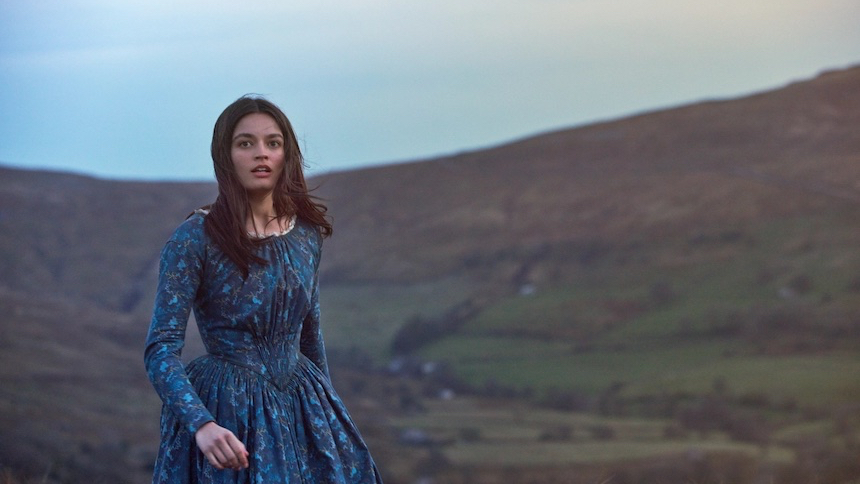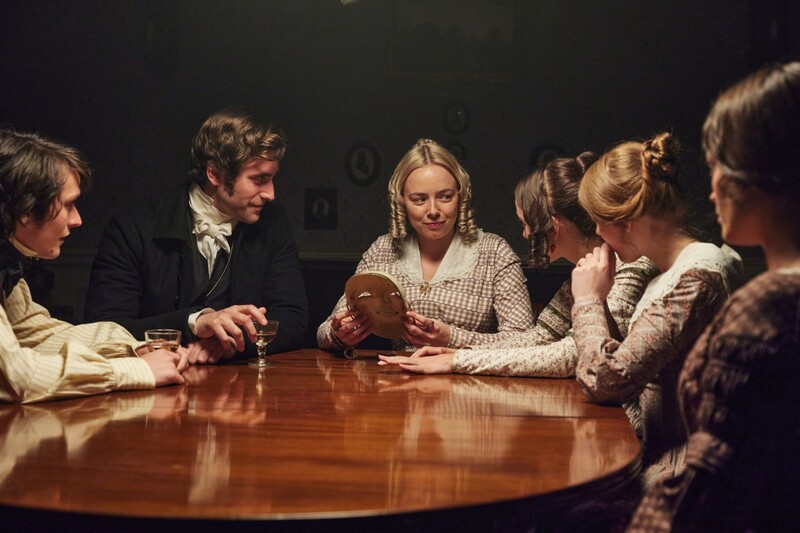EMILY Review: A Turbulent Soul Creates a Gothic Masterpiece
Directed by Frances O'Connor, the film stars Emma Mackey, Oliver Jackson-Cohen, and Fionn Whitehead.

There is a reason why Emily Brontë's novel Wuthering Heights has remained a literary favourite, a mainstay of school books lists, and had several adaptations in film and television: it is very well written, and it is terrifying. One of the supreme horror gothic stories, that horror part often is forgotten when dismissed by those who see it as just a doomed romance. But really, what is more horrible than having your heart shattered? What else ellicits such a torrent of emotion in a person, as having our most precious gift shattered by someone we trust?
Frances O'Connor (Mansfield Park, A.I. Artificial Intelligence) makes her directorial debut in Emily, a portrait of the famed writer in the years of her life that fed into the book that would make her famous. While it might look at first glance as a typical biopic, O'Connor eschews much of the typical tropes to truly put her heroine in the centre of the frame - not just visually or to convey certain information, but her emotional state, her soul and heart enflamed, and the horrors and hauntings that both came from her and were fed into her in an endless cycle.
Emily (Emma Mackey, Sex Education) lives in a small town in the Yorkshire moors, with her Reverand father (Adrian Dunbar), sisters Charlotte and Anne (Alexandra Dowling and Amelia Gething), and beloved brother Branwell (Fionn Whitehead). Their home belies their working class status, and all the girls are expected to work for a living as teachers, one of the few respectable positions open for women, while Branwell attends art school. But Emily is not cut out for such a life; already saddled with a reputation for being strange, she is both unaware of it and embraces this distinction, running wild on the moors, writing poetry, and eventually having a torrid affair with the Curate, William (Oliver Jackson-Cohen, The Haunting of Bly Manor).
These might all seem like familiar historical boipics tropes, but O'Connor has been no stranger to this film genre (Mansfield Park remains the best Austen adaptation), and she has a very intimate and keen understanding of the tone of Brontë's work. Everything (or almost everything), really every frame, places Emily at its centre: she is the heart and soul from which we understand this world. She is both bold and terrified: she is connected to the place in which she lives, to its nature, its wind: this might be a rainy place, but the smoke and fire that fills Emily seem to keep her warm no matter how much she spends outdoors, more at home there that the salons and kitchens that are her presumed place.
When Branwell leaves art school, claiming to want to be a writer instead, he and Emily grow even closer, spying on neighbours; at the same time, she begins her affair with William, and man who might be enchanted with her, but still feels compelled to conform to society. One night, playing a strange parlour game with friends, we get what is truly a terrifying moment, the kind of scene in film that makes your blood run cold, where you are equally enthralled and petrified. Emily's complete commitment to this moment, to putting herself in such a place of danger, opening her soul to every possible experience even if it destroys her.
O'Connor infuses the film with hints of Wuthering Heights, exploring how moments large and small would have contributed to its story; and yet, these are never exagerrated nor sign-posted - which might be detrimental for any who have not read the novel, but for those familiar, we see these are we see the moments in our own life that we don't recognize will be significant. Again, always centering Emily in the story - the strange girl, who has little patience for societal expectations, who wears her heart on her sleeve and exposes her soul to the wilds around her.
Mackey absolutely throws herself into the part, never wavering even as Emily must battle between her obligations, her sibling bond with Branwell, at once helped by their joint rejection of societal expectations and hindered when each finds love the other disapproves of, and her affair with William. Its passion and the violence it leads to, led Emily to write with passion and violence, and Lackey lets every emotion float across her eyes and face. It's impossible not to be enthralled, especially with cinematographer's Nanu Segal's unsentimental and often brutal view of the landscape and its inhabitants, and a score (produced by Mina Korzeniowski) that matches Emily's often dizzying, feverish heights.
A quietly remarkable directorial debut, Emily will bring many emotions and thoughts to its audience, from terror to passion to horror to anger to entrancing first love. O'Connor eschews the more typical biopic tone and tropes to craft something as unique as the titular character.
Emily will be released in select cinemas in the USA on Friday February 17th, and in Canada on Friday February 24th. This review was first published for Sitges Festival 2022.
Emily
Director(s)
- Frances O'Connor
Writer(s)
- Frances O'Connor
Cast
- Emma Mackey
- Oliver Jackson-Cohen
- Fionn Whitehead








